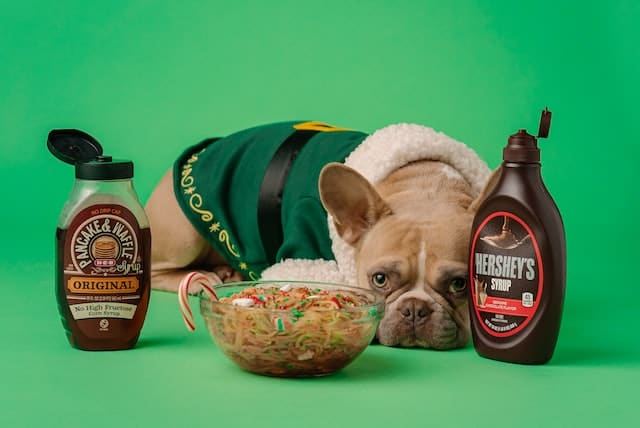Dogs can eat almost anything, but some foods can hurt their body. So, what foods dogs cannot eat is something you need to know before you give them food. There are some foods which are dangerous for dogs. The dog should not eat the following foods. They may cause him terrible disorder and even death. Not to mention, they can make a normal dog very sick for hours or days.
Top 20 Foods That Dogs Cannot Eat
- ONIONS, GARLIC
- Avocado
- Corn on the Cob
- Chocolate
- Alcohol
- Sweeteners
- Grapes
- Cooked Fat Trimmings Bones
- Macadamia Nuts
- Sugary foods & Drinks
- Milk and Dairy Producs
- Caffeine
- Salt
- Yeast Dough
- Peaches, plums, Persimmons
- Xylitol
- Tea
- Raw Eggs (Not Too Much)
- Meat & fish
- Human Medicine
Make sure that any dog treats you buy are made only in the United States or Canada
Dogs can eat many of the same foods that we eat, as long as they are healthy and not allergic to any of the ingredients. However, there are a few foods that should be avoided.
Dogs and chocolate. Chocolate contains caffeine and theobromine, both of which are toxic to dogs. The darker chocolates contain more of these substances than milk chocolate does and therefore pose a greater risk to your dog’s health. Chocolate also contains sugar, which isn’t good for dogs either.
Dogs and onions, garlic and other vegetables in the allium family (onions, garlic, leeks). These vegetables are toxic to dogs because they contain thiosulphate anions that damage red blood cells in the body. While cooking these vegetables helps remove some of these toxins, it isn’t enough to make them safe for dogs to eat.
Dogs and grapes or raisins. Grapes and raisins can cause kidney damage when consumed by dogs because they contain high amounts of potassium sorbate (a preservative) in their stems and leaves.
Avoid Rawhides And Consider Much Healthier Alternatives
Rawhide is a popular chew toy for dogs. However, it’s not good for them. Rawhide is made from the skin of a cow or horse and can be dangerous if consumed by your pet.
Rawhide treats may also cause choking and blockages in the digestive tract if they are too small. The American Society for the Prevention of Cruelty to Animals (ASPCA) recommends that you never give your dog rawhide because it can cause gastrointestinal upset, choking and intestinal blockage, among other problems.
If you’re looking for a safer chew toy, consider these alternatives:
- Bones: Bones are an excellent choice if they come from a reputable source and have been thoroughly cleaned. Try chicken necks, turkey bones or beef marrow bones that have been boiled clean before giving them to your pet.
- Tough chews: Look for toys made from durable materials like rubber, nylon or hard plastic that are specifically designed for chewing. Kongs and Nylabones are two popular choices because they last longer than most other dog chews. You can also use old socks stuffed with treats or peanut butter as long as they’re big enough that your dog isn’t likely to swallow them whole or break off pieces small enough to choke on).
Be Sure to Offer Your Dog Healthy Snacks, But Not Too Many Of Them.
Dogs are omnivorous, meaning they can eat both meat and plants. But just like humans, dogs have different nutritional needs. Some foods are good for them, while others can be harmful and even toxic.
Whether you’re in the market for a new puppy or want to make sure your dog is getting the best possible nutrition, here are some foods that you should never feed your dog:
- Chocolate
- Grapes and raisins
- Onions, garlic and other members of the onion family (leeks, shallots)
- Macadamia nuts
- Avocados
- Bones from chicken or other meats
Chocolate: Chocolate Contains Ingredients Called Theobromine And Caffeine That Are Toxic To Dogs’ Central Nervous Systems.
Chocolate: Chocolate contains ingredients called theobromine and caffeine that are toxic to dogs’ central nervous systems, as well as their heart muscles.
Grapes and raisins: Grapes and raisins can cause kidney damage in dogs, making them potentially fatal if consumed in large quantities.
Onions: Onions contain thiosulphate, which can damage red blood cells and cause anemia in dogs.
Macadamia nuts: Macadamia nuts contain a toxin that can result in muscle tremors, weakness, paralysis and possibly death if ingested by a dog.
Caffeine: Caffeine is poisonous to dogs because it has a diuretic effect on their bodies, causing dehydration that results in seizures or death if not treated quickly enough with IV fluids and other supportive care methods.
Grapes or raisins: Grapes and raisins (dried grapes) are counter-indicated for any dog.
Grapes or raisins: Grapes and raisins (dried grapes) are counter-indicated for any dog, despite the fact that no one is sure why some dogs eat grapes and others don’t. Theories range from the silly to the plausible, but no one really knows what causes this reaction.
Onions, leeks and chives: Dogs can be very sensitive to onions and related vegetables like garlic, leeks and chives. All these foods contain sulfur compounds that can damage red blood cells in the same way they do in people with hemolytic anemia.
Avocado: Avocados contain persin, a toxin which can cause vomiting, diarrhea, abdominal pain and even collapse in dogs.
Conclusion
There are many foods that dogs can eat, like eggs and peanut butter. But others, like grapes and onions can pose a threat to a dog’s health. If your dog needs a special diet for any reason, check with your vet before making food choices for them. Dogs who live to be fifteen or twenty years old can still be fun, companionable pets. By feeding them properly and providing them with the exercise they need, you can help ensure that your dog lives a long life.
Related: Cracked Raw Eggs Over Dog Food?

